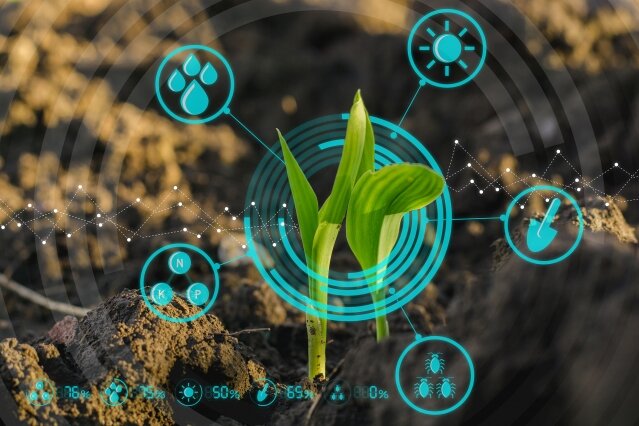Massachusetts Institute of Technology
by Scott Murray
With a couple billion more people estimated to join the global population in the next few decades, world food production could use an upgrade. Africa has a key role to play: Agriculture is Africa’s biggest industry, but much of Africa’s agricultural land is currently underutilized.
Crop yields could be increased with more efficient farming techniques and new equipment—but that would require investment capital, which is often an obstacle for farmers.
A new research collaboration at the MIT Institute for Data, Systems, and Society (IDSS) aims to address this challenge with data. The group plans to use data from technologically advanced farms to better predict the value of intervention in under performing farms. Ultimately, the goal is to create a platform for sharing data and risk among invested parties, from farmers and lenders to insurers and equipment manufacturers.
Sharing data, sharing risk
Many African farmers lack the capital to invest in yield-increasing upgrades like new irrigation systems, new machinery, new fertilizers, and technology for sensing and tracking crop growth. The most common path to capital is bank loans, with land as collateral. This is an unattractive proposition for farmers, who already bear the many risks of production, including bad weather, changing market prices, or even the shocks of geopolitical events.
Lenders, on the other hand, have an incomplete assessment of their risk, especially with potential borrowers who have no credit history. Lenders also lack data and tools to predict their return on investment.
“Building a platform for risk-sharing is key to upgrading farming practices,” says Munther Dahleh, a professor of electrical engineering and computer science at MIT and director of IDSS. In order to create such a platform, Dahleh and the IDSS team aim to better predict the value of employing advanced farming practices on the production of individual farms. This prediction needs to be accurate enough to incentivize investment from economic stakeholders and the farmers themselves, who are in competition with each other and may be reluctant to share information.
The IDSS approach proposes a data-sharing platform that incentivizes all parties to participate: Technologically advanced farms are rewarded for their valuable data, bankers benefit from data that support their credit risk models, farmers get better loan terms and recommendations that increase their profits and production, and technology companies get recommendations on how to best support the needs of their farmer customers. “Such a platform has to have the correct incentives to engage everyone to participate, have sufficient protection from players with market power, and ultimately provide valuable data for farmers and creditors alike,” says Dahleh.
The absence of data from underperforming farms presents a challenge to extrapolating the value of intervention and assessing the uncertainty in such predictions. With sparse available data, researchers are looking to conduct experiments in strategically selected farms to provide valuable new data for the rest. Researchers will use advanced machine learning, including active learning methodology, to try to achieve both a quantification of the predicted value of intervention and a quantification of the uncertainty of that prediction to a degree of confidence. Once more data is available, IDSS researchers intend to refine their calculations and develop new techniques for extrapolating the value of intervention in less-advanced farms.
Engaging stakeholders
One likely intervention for many African farmers involves using different fertilizers. Many farmers aren’t currently using fertilizers targeted to specific soil or various stages of farming—so fertilizer producers are another vested interest in this agriculture economy.
To help these farmers get access to better loan terms, Moroccan phosphate company OCP is funding a collaboration between IDSS researchers and Mohammed VI Polytechnic University (UM6P) in Morocco. This research collaboration with OCP, a leading global company in the phosphate fertilizer industry, includes building the data- and risk-sharing platform as well as other foundational research in agriculture. The collaboration has the potential to engage other stakeholders working or investing in African agriculture.
“This collaboration will help accelerate our efforts to develop pertinent solutions for African agriculture using high-level agri-tech tools,” says Fassil Kebede, professor of soil science and head of the Center for Soil and Fertilizer Research in Africa. “This will offer farmers possibilities for better production and growth, which is part of our mission to contribute to Africa’s food-security objectives.”
“African farmers are at the heart of the OCP Group’s mission and strategy, while data analytics and predictive tools are today essential for agriculture development in Africa,” adds Mostafa Terrab, OCP Group chair and CEO. “This collaboration with IDSS will help us bring together new technology and analytical methods from one side, and our expertise with African farmers and their challenges from the other side. It will reinforce our capabilities to offer adapted solutions to African farmers, especially small holders, to enable them to make more precise and timely decisions.”
Ultimately, IDSS aims to bring wins across an entire economic ecosystem, from insurers to lenders to equipment and fertilizer companies. But most importantly, boosting this ecosystem could help lift many farmers out of poverty—and bring about a much-needed increase in the world’s aggregate food production.
Says Dahleh: “To accomplish this mission, this project will demonstrate the power of data coupled with advanced tools from predictive analytics, machine learning, reinforcement learning, and data sharing markets.”







